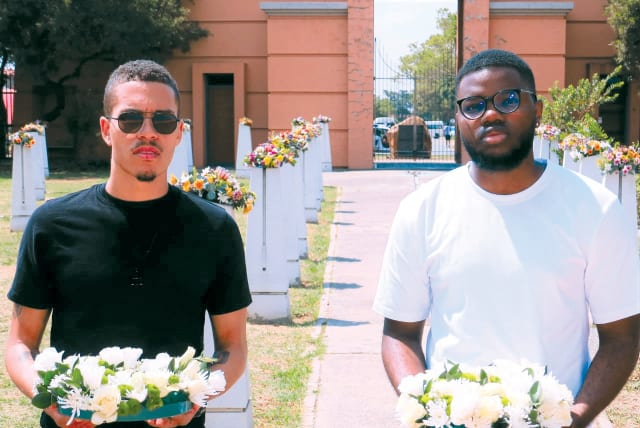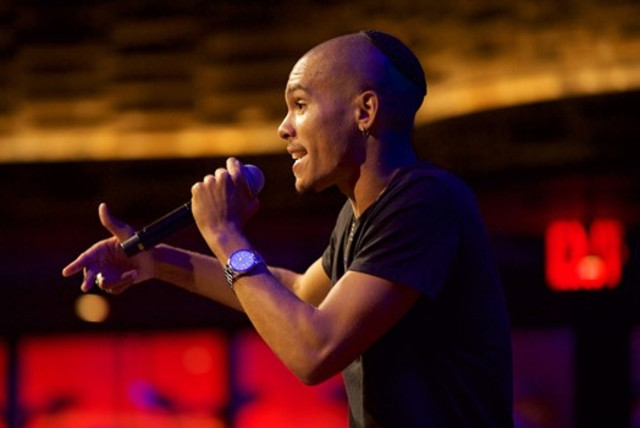Israeli hip-hop's 'Westside Gravy' meets South Africa's Tanaka Jura

The artists worked on the lyrics independently of each other, but both drew on their personal experiences of racism.
“I am a proud part of the Diaspora. …. In my heart I hold Jerusalem and Africa,” says hip-hop artist Noah Shufutinsky (aka Westside Gravy) in his song “Diaspora.” As a black Russian Jew, born in America and living in Israel, he uses music to both reflect on and embrace his mixed heritage and multiple identities. Noah recently visited South Africa as part of a StandWithUs delegation to counter the BDS-driven Israel Apartheid Week on university campuses.
While there, he collaborated with Tanaka Jura (aka July56), a local hip-hop artist with Zimbabwean roots, on a new song titled “Never Shaken,” whose core theme confronts issues of antisemitism, xenophobia and racism. Their first performance together for the music video at a nightclub in Rosebank, Johannesburg, saw an enthusiastic audience singing along with gusto.
The artists worked on the lyrics independently of each other, but both drew on their personal experiences of racism. Shufutinsky talks about how his parents warned him about the bigotry he would face and how he would have to work twice as hard as the classmate sitting next to him who was neither Jewish nor black:
“Growin’ up the way I did, parents really shaped a kid, Prepared me for the worst still held expectations, The hatred I was faced with, Not allowed to take up space, as a reason for me not to reach the greatness, That I was destined to, and when they preventing you, you work twice hard ‘cuz you can’t just let it get to you…”
Jura, who was born in Zimbabwe and grew up in Johannesburg, was surprised to encounter Afrophobia (a strong anti-African sentiment against nationals coming into South Africa from neighboring countries) as a youth. He experienced exclusion and bullying. However, like Shufutinsky, he is determined not to let hatred define who he is but rather rise above it. In his words:
“I face fear without hesitation, When it’s our turn to shine they like to underplay it. Social media’s telling lies, but we live a real life so we can’t fake it. The pain of the past is still on our faces. Still we find a way to smile through these generations.”
The universality and uniqueness of racism
What brings this song together is both the universality and uniqueness of racism. Noah and Jura each have different identities. Both have dealt with issues which are different, yet they share commonalities. Neither of them, moreover, will allow such racism to define them, but they will rather become stronger and more determined. And this is the chorus of their song, “If our minds come together, we cannot be shaken.” The duo hope it will become a mantra for those needing to empower themselves.
They also hope to set a new trend of Black-Jewish cooperation. For both artists, working together was an opportunity to reconnect with their own personal stories, as well as their deeper roots. Jura’s musical journey started in a Jewish household. A friend with whom he often hung out had a recording studio, where the two would make music. Except one Saturday, when he arrived expecting to play and was told that they would not be able to, as it was Shabbat. Jura was interested to know more about his friend’s culture and religion. And, until he worked with Shufutinsky, he hadn’t known there even were Black Jews.
For Shufutinsky, being in Africa for the first time and collaborating with a South African Zimbabwean was also of deep personal significance. Hip-hop, the music in which he expresses himself, comes out of the African American community. To be in Africa and to work with a local artist was thus deeply meaningful. It reinforced the global connections of the Black diaspora around the world. And these connections are essential to break down stereotypes and barriers.
Hip-hop is the language of youth (in the US, it has overtaken rock in popularity). As rappers, the two artists hope to be role models. Their message of defining oneself rather than allowing one to be defined by others, is a powerful one. Both believe that racism is not spoken about enough. They hope their collaboration will provide a case study of how music can bring people together, breaking down barriers and misconceptions about identity and allowing them to talk about difficult topics.
Here is a link to the video: https://youtu.be/zgr5Zlrdn_0 ■ The writer is head of communications at the South African Jewish Board of Deputies.
Jerusalem Post Store
`; document.getElementById("linkPremium").innerHTML = cont; var divWithLink = document.getElementById("premium-link"); if (divWithLink !== null && divWithLink !== 'undefined') { divWithLink.style.border = "solid 1px #cb0f3e"; divWithLink.style.textAlign = "center"; divWithLink.style.marginBottom = "15px"; divWithLink.style.marginTop = "15px"; divWithLink.style.width = "100%"; divWithLink.style.backgroundColor = "#122952"; divWithLink.style.color = "#ffffff"; divWithLink.style.lineHeight = "1.5"; } } (function (v, i) { });

